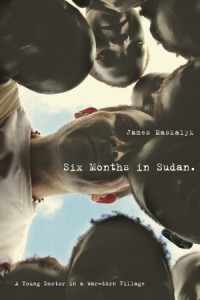What Will Await Me?
The image I have below is the cover of a book titled “Six Months in Sudan” by Dr. James Maskalyk, a Canadian doctor that worked in the field through MSF (Médecins Sans Frontières – Doctors Without Borders) in 2007. I first heard of this book through a seminar held by UBC’s STAND about a week ago, and have been looking for a place to either borrow it from or buy it for my own. Luckily, I found it in the bookshelves of my local public library back in Coquitlam.
“Six Months in Sudan” recounts the day-to-day events experienced by Dr. James Maskalyk in the war-torn village of Abyei, Sudan as he acted as the designated attending physician in the village. Even his experience as a doctor in Canadian hospital emergency wards could not have prepared him for the crisis that awaited him in Abyei. This is a story about foreign aid and the struggles experienced by one man as he observed the situation in Sudan from a neutral standpoint – a témoignage.
Although I’ve only just started reading this book, I already have a couple of deep thoughts about it. Maskalyk starts his story at the ‘end’ of his journey – a month after he had returned from Sudan. He recounts the distance he feels from his family and friends as he reminisces back to his time back in the field. He then rewinds to the beginning of his journey, when he was working through the logistics of his departure. Maskalyk’s reasoning for heading to Sudan really stuck with me as I flipped through the pages of his book:
“I wanted to see who I was when everything was taken from me, when there was no insulation between me and the rest of the world.”
This made me think about what kind of human being I would be when everything that I had was taken from me. I mean, how much does what I possess define who I am? How would I act if I lived in a war-torn country, if I had barely anything to eat, if I had nearly nothing at all? Would I still be the person that I am here in a country like Canada?
I’ll have similar thoughts racing through my head until I finish this book. Reading about Dr. Maskalyk’s experiences in foreign aid makes me question the reasons in which I’m going into Global Health for and if I’m really just being idealistic about the world in which I live in. There’s so many places I have yet to see, so many people that I have yet to meet. I’m so insulated in this comfortable bubble called my life that I feel very ignorant about what’s going on around the rest of the world. I want to know more. I want to see more and experience it. But I’m also terrified of what awaits me out there. I fear that I won’t be able to handle the horrors calmly enough to work towards what is beautiful.
But I can’t stand being so ignorant about everything either.

